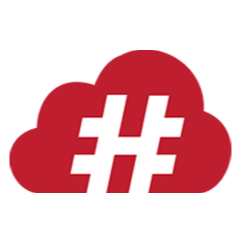Did you know that, according to data from Emerald Insight, 49% of companies across various industries report that implementing ERP systems has boosted their productivity?
This improvement is possible because ERP systems streamline productivity by managing critical data within a single, integrated platform. As a result, more companies, including those in the pharmaceutical sector, are adopting ERP solutions to enhance their business operations.
But which ERP system is the most suitable for pharmaceutical businesses? This article highlights the 9 best ERP for pharmaceutical industry in Malaysia in 2025. Explore these options to discover the vendor that aligns best with your business needs. Dive into the details below to learn more!
Key Takeaways
|
Table of Content
Content Lists

What is ERP for the Pharmaceutical Industry?
ERP for the pharmaceutical industry is a comprehensive solution designed to manage and optimize essential processes such as drug manufacturing, quality assurance, regulatory compliance, and supply chain management.
This software typically includes modules for inventory control, batch monitoring, formulation management, electronic batch records, quality control, document management, and compliance tracking. These features work together to streamline operations, enhance productivity, and ensure the safety and effectiveness of pharmaceutical products.
Why ERP Solutions Are Essential for Pharmaceutical Businesses?
Pharmaceutical companies rely on ERP software for several critical reasons:
- Ensuring Compliance: ERP systems help businesses adhere to regulations, such as FDA standards, by streamlining documentation, tracking processes, and maintaining accurate records. This ensures companies stay compliant and avoid potential penalties.
- Maintaining Quality: Real-time monitoring of production processes ensures that products consistently meet safety and quality standards, minimizing the risks of recalls and safeguarding consumer trust.
- Managing Inventory: ERP software tracks raw materials, finished goods, and expiration dates to reduce waste, prevent stock shortages, and maintain an optimal inventory balance, ensuring efficient operations.
- Batch Traceability: With full traceability from production to distribution, ERP systems simplify recalls, facilitate audits, and improve overall accountability in the supply chain.
- Controlling Costs: By providing real-time data on expenses, ERP software enables businesses to manage costs effectively, identify areas for savings, and improve profitability.
How ERP Benefits the Pharmaceutical Sector?
ERP software integration for pharmaceutical industry plays a vital role by streamlining operations, ensuring adherence to strict regulatory requirements, and providing several other advantages, including:
- Ensures Compliance: ERP software for pharmaceutical industry helps companies meet stringent industry regulations and maintain product safety standards through automated documentation and process tracking. This reduces the risk of penalties and enhances regulatory confidence.
- Optimizes Inventory: Enables efficient stock management by tracking inventory levels, reducing carrying costs, and preventing shortages or overstocking, ensuring smooth production cycles.
- Boosts Quality: Automates quality assurance processes to uphold high product standards while reducing manual errors and improving consistency. This ensures products meet both company and regulatory expectations.
- Integrates with Labs: Seamlessly connects with Laboratory Information Management Systems (LIMS), ensuring accurate data recording, minimizing manual entries, and promoting faster, error-free lab operations.
- Tracks Batches: Provides end-to-end traceability for every batch, from production to delivery, ensuring improved safety, compliance, and simplified recall processes when necessary.
The Best ERP for Pharmaceutical Industry in Malaysia (2025)
Selecting the right ERP system for the pharmaceutical industry is essential to handle the complexities of business operations. Below is a list of top ERP software solutions tailored for pharmaceutical manufacturing companies in Malaysia.
1. HashMicro pharmaceutical ERP software
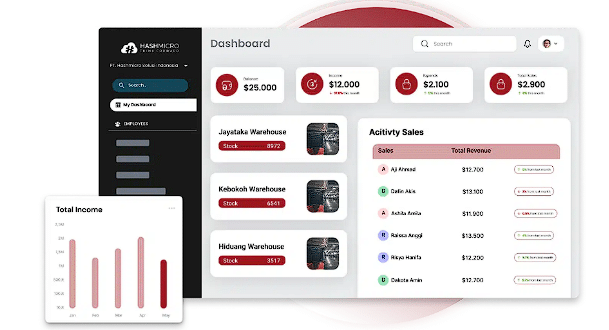
For companies seeking a flexible and industry-specific solution, HashMicro ERP is a top recommendation. This cloud-based platform boosts efficiency across various industries and has already supported more than 1,750 clients. HashMicro provides a free demo, extensive customization capabilities, and a wide range of robust tools, including:
- Integrated BI (Business Intelligence): Provides multi-dimensional data analysis to deliver comprehensive and actionable insights.
- Streamlined Bookkeeping: Automates transaction recording for precise and transparent financial reporting.
- Production Cost Management: Facilitates detailed cost control, including procurement, production outputs, and defective component handling.
- Multi-Company Oversight: Centralizes the management of multiple companies with varied structures within a single ERP system.
- Mobile Accessibility: Available on iOS and Google Play Store, enabling seamless access via mobile devices.
- Spreadsheet Automation: Simplifies the management, automation, and analysis of spreadsheets, ensuring data security and smooth module integration.
- Role-Based Access Control: Restricts data and feature access for employees based on their specific roles and responsibilities.
| Pros | Cons |
| Intuitive and easy-to-navigate interface | New users may need comprehensive training to utilize it effectively |
| Excellent customer support services | Less ideal for small-scale businesses |
| Effortless integration with third-party software | Customization options may be limited for specialized requirements |
| Frequent updates and feature improvements | Higher upfront costs for implementation |
Why We Chose It: Selected for its highly customizable and user-friendly ERP solutions, tailored to address the intricate demands of the pharmaceutical industry.
2. NetSuite
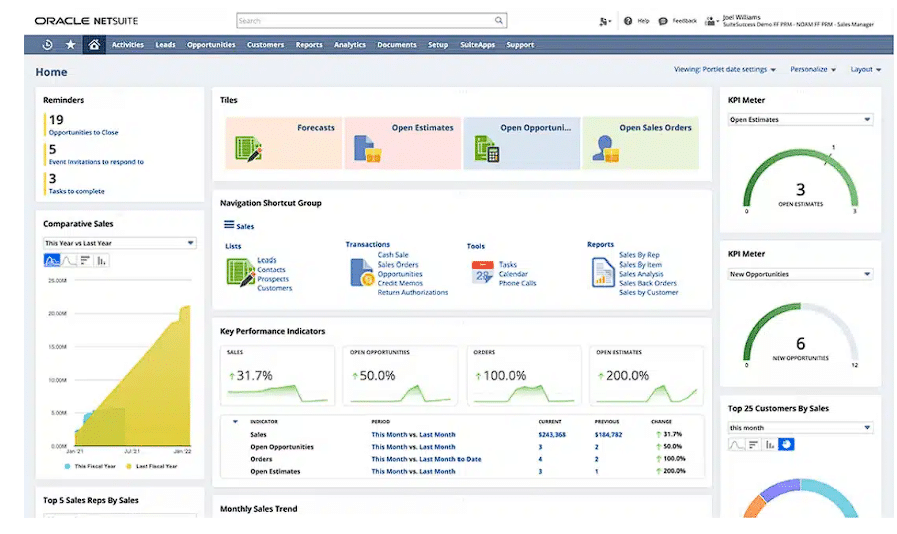
NetSuite is one of the best ERP software for pharmaceutical industry equipped with features such as inventory management, supply chain optimization, and regulatory compliance. It enables businesses to enhance efficiency and streamline operations by offering real-time insights into inventory management.
Key Features:
- Real-time financial tracking and management
- Sophisticated supply chain planning capabilities
- Tools for ensuring regulatory compliance
- Integrated CRM and inventory management systems
| Pros | Cons |
| Outstanding customer service | May need additional third-party integrations |
| Extensive global presence and support | Customization can be complicated |
| Robust data analytics features | Challenging learning process for new users |
| Scalable to accommodate business growth | Higher subscription costs per month |
Why We Chose It: Chosen for its scalable cloud-based solution that provides extensive tools for real-time data management and ensuring regulatory compliance.
3. Misys pharmaceutical ERP software
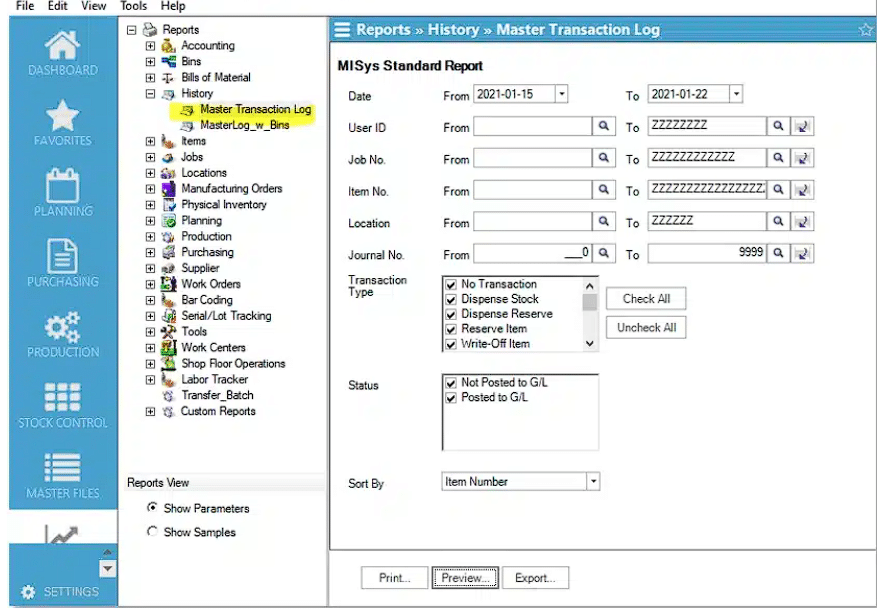
Misys is one of top ERP software for pharmaceutical industry that offers well designed system to meet the unique requirements of the pharmaceutical industry. Its features include batch tracking, quality assurance, and compliance management, helping businesses maintain product safety while optimizing their operations.
Key Features:
- Traceability for batches and lots
- Real-time management of inventory levels
- Tools to support regulatory compliance
- Scheduling capabilities for production processes
| Pros | Cons |
| Wide range of features and capabilities | Slower updates to the system |
| Flexible workflows that can be customized | Limited pre-built integration options |
| Advanced reporting capabilities | Significant implementation costs |
| Strong tools for ensuring compliance | Requires in-depth training for effective use |
Why We Chose It: Favored for its strong, industry-specific features that optimize production workflows and provide excellent compliance support.
4. R4 Enterprise pharmaceutical ERP software
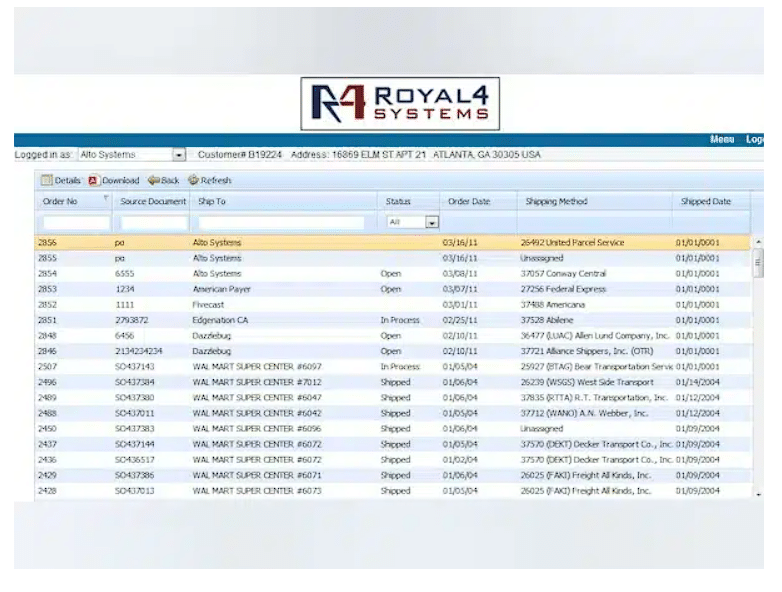
R4 Enterprise’s ERP solution features extensive batch tracking and quality control modules, ensuring high product standards and compliance with industry regulations. Its advanced tools for testing, inspection, and documentation provide significant value to pharmaceutical manufacturers.
Key Features:
- Adherence to FDA and GMP regulatory standards
- Tracking for production and inventory processes
- Comprehensive quality control and assurance tools
- Real-time insights for data-driven decision-making
| Pros | Cons |
| Real-time monitoring of data | Limited scalability for larger organizations |
| Dependable customer support | Integration with other systems can be challenging |
| Robust compliance with regulatory standards | Interface may be difficult for beginners to navigate |
| Mobile access for greater flexibility | Customization might incur extra costs |
Why We Chose It: Selected for its emphasis on regulatory compliance and real-time monitoring, making it a dependable choice for highly regulated industries such as pharmaceuticals.
5. Datacor ERP
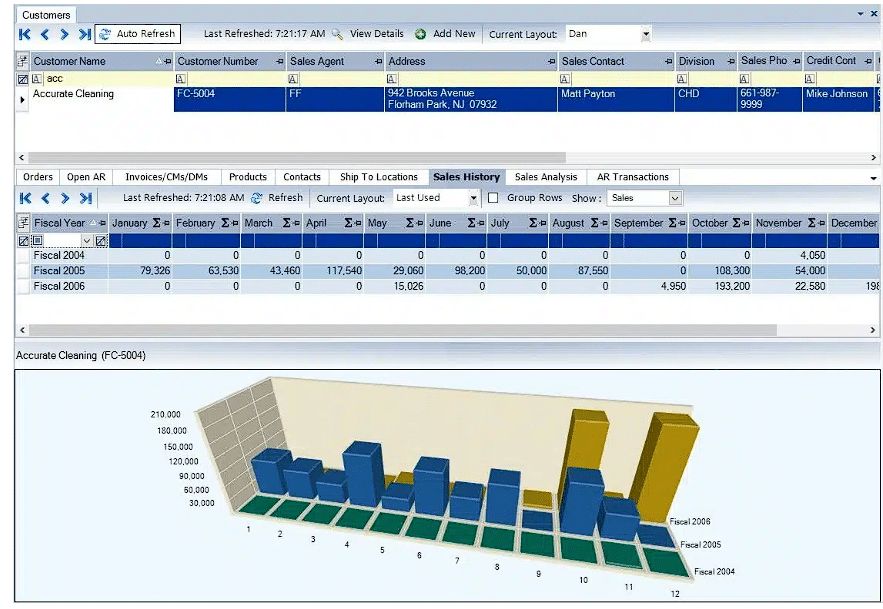
Datacor’s ERP system enhances efficiency for pharmaceutical businesses by automating tasks and streamlining workflows. It provides real-time insights into production, inventory, and financial data, enabling companies to make well-informed decisions and maximize resource utilization.
Key Features:
- Detailed tracking of batches
- Built-in quality management tools
- Advanced production planning and scheduling capabilities
- Modules designed for regulatory compliance
| Pros | Cons |
| High-level data security | Limited options for global support |
| Robust features for meeting regulatory requirements | Learning curve may be challenging for beginners |
| Customizable and user-friendly dashboards | Periodic manual updates are necessary |
| Easy-to-navigate interface | May lack advanced features for large-scale businesses |
Why We Chose It: Selected for its user-friendly interface and robust data security, designed to support efficient batch tracking and quality management.
6. Prims ERP
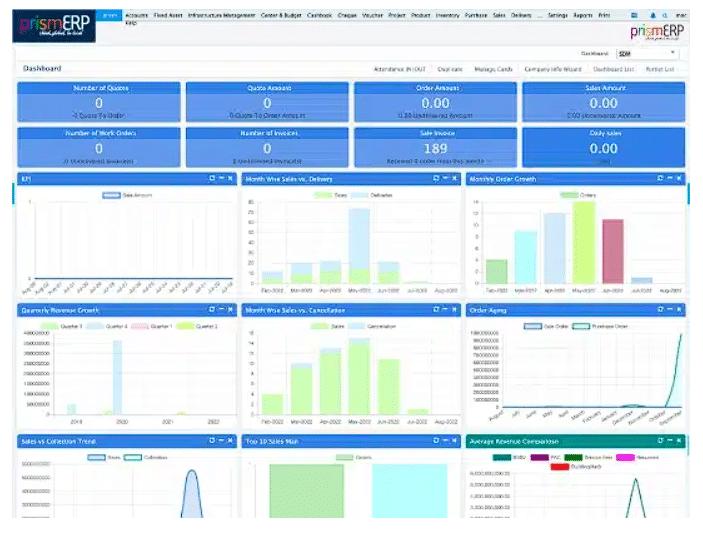
PRIMS is one of the top ERP software for pharmaceutical industry with sophisticated batch management capabilities, allowing pharmaceutical companies to monitor the complete lifecycle of each batch. This functionality is essential for maintaining product quality and meeting regulatory standards, ensuring both compliance and product reliability.
Key Features:
- Advanced production and batch tracking
- Automated quality control processes
- Comprehensive inventory management
- Tools for compliance and detailed reporting
| Pros | Cons |
| Budget-friendly for mid-sized businesses | May not include advanced analytics features |
| Reliable customer support | Fewer integration options available |
| Fast setup and implementation process | Limited scalability for expanding businesses |
| User-friendly and straightforward interface | Basic reporting functionalities |
Why We Chose It: Chosen for its straightforward design and rapid implementation, making it an excellent option for medium-sized pharmaceutical companies looking for quick ERP deployment.
7. Syspro
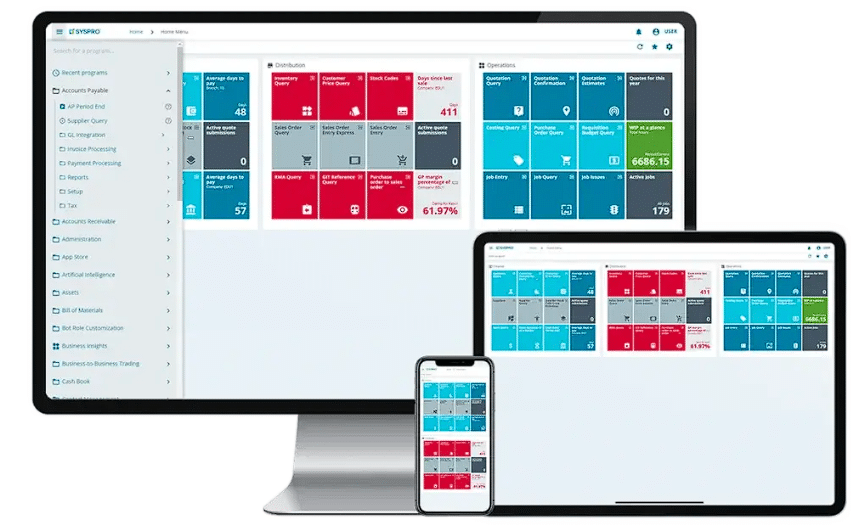
Syspro’s ERP software Malaysia features advanced planning and forecasting tools to enhance production scheduling and resource optimization. It also includes quality control modules to ensure compliance with industry standards through thorough testing, inspection, and documentation.
Key Features:
- Lot and serial number tracking
- Inventory management and optimization
- Quality control and regulatory compliance tools
- Efficient production scheduling
| Pros | Cons |
| Comprehensive tools for managing compliance | Needs dedicated IT support for operations |
| Strong features for inventory control | Extended implementation timeline |
| Seamless integration with other systems | User interface may appear outdated |
| Flexible and customizable | Occasional performance issues with heavy data processing |
Why We Chose It: Chosen for its adaptable and customizable features, offering excellent inventory management and strong regulatory compliance capabilities.
8. Nulogy ERP solutions for pharma
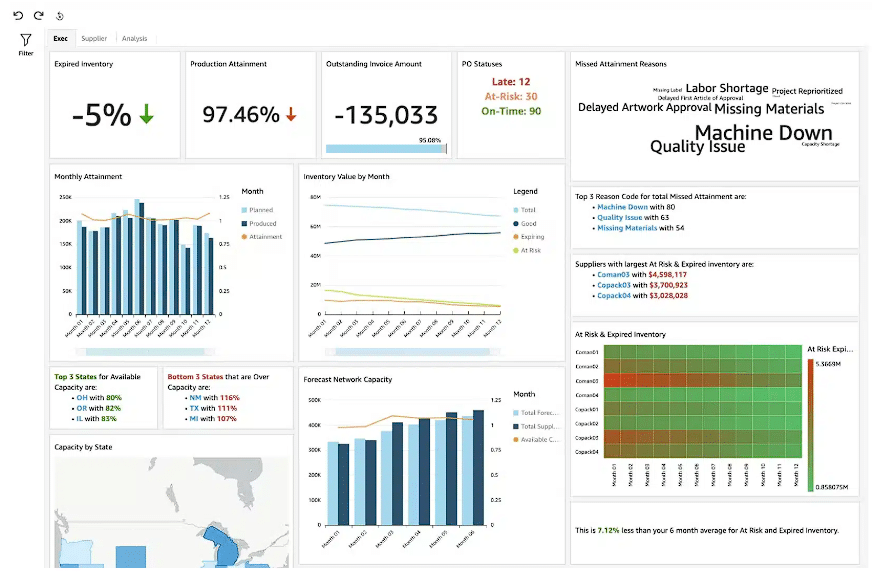
Nulogy’s ERP software improves supply chain transparency and collaboration by providing real-time tracking of materials, production activities, and shipments. Its advanced quality management tools ensure product integrity through rigorous testing and detailed documentation.
Key Features:
- Real-time visibility into supply chain operations
- Comprehensive compliance and quality assurance tools
- Inventory monitoring capabilities
- Collaborative planning features for enhanced coordination
| Pros | Cons |
| Frequent software updates for improved performance | Limited functionality without an internet connection |
| Cloud-based system accessible from any location | Customization options may not meet all specific requirements |
| Enhanced visibility across the supply chain | Can be expensive for smaller businesses |
| Powerful tools for seamless collaboration | Full features require reliable internet access |
Why We Chose It: Selected for its cloud-based architecture and real-time supply chain tracking, enabling efficient collaboration across the pharmaceutical supply chain.
9. Opcenter
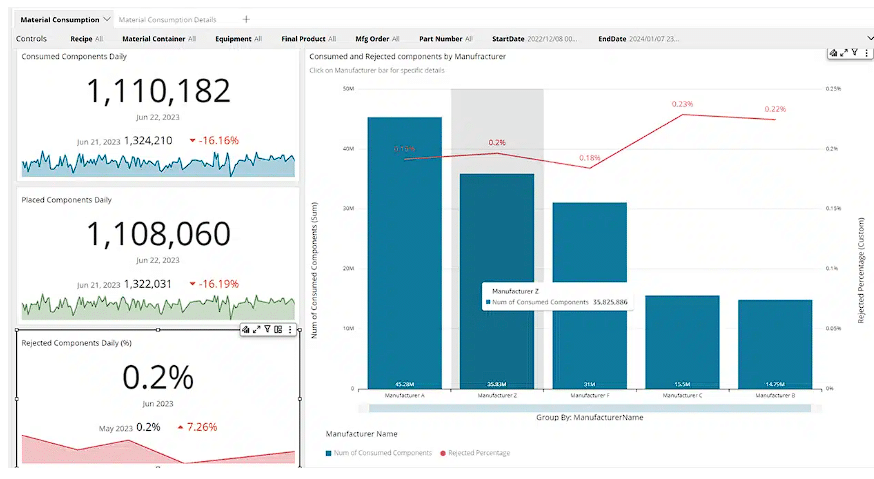
Opcenter delivers a robust ERP solution designed to enhance and simplify production workflows. With its suite of tools for production planning, scheduling, and resource allocation, businesses can boost efficiency and minimize lead times.
Key features include:
- Seamless MES integration
- Sophisticated quality management tools
- Real-time monitoring of production processes
- Features ensuring regulatory compliance
| Pros | Cons |
| Precise data accuracy and robust traceability | Premium cost due to advanced functionalities |
| Enhanced manufacturing functionalities | Complex setup process |
| Seamless integration with MES systems | Requires comprehensive training for optimal utilization |
| Exceptional quality management tools | Best suited for large-scale enterprises |
Why we choose: We selected it for its superior manufacturing capabilities and extensive MES integration, which guarantee accurate production processes and effective quality management.
How to Select an ERP for the Pharmaceutical Sector
Choosing the right ERP for the pharmaceutical sector requires evaluating key factors to address your business needs effectively:
- Understand your requirements: Assess your company’s needs, such as regulatory compliance, quality control, or batch tracking, to find an ERP that fits your operations.
- Compliance features: Opt for an ERP that offers built-in tools to support industry regulations (FDA, GMP), ensuring seamless compliance.
- Quality management: Seek software that automates quality inspections and manages batch tracking, ensuring consistent standards.
- Scalability: Choose an ERP capable of scaling with your business, preventing expensive future upgrades.
- Data protection: Ensure the ERP includes robust security features, like encryption and access controls, to protect sensitive data.
- Cost evaluation: Consider the total cost, including setup, maintenance, and training, to make sure it aligns with your budget.
Conclusion
In conclusion, ERP software plays a crucial role in streamlining the intricate processes involved in pharmaceutical manufacturing. These solutions provide various tools designed to meet the specific demands of the industry, assisting businesses in adhering to regulations, boosting productivity, and managing resources efficiently.
However, selecting the right ERP system can be a challenge. To experience a personalized solution, consider HashMicro ERP software. You can request a free demo to explore its features before making a decision. Reach out today and take the first step towards optimizing your pharmaceutical operations in Malaysia!

FAQs about ERP for Pharmaceutical Industry
-
What is Pharmacy System?
A Pharmacy System is a specialized software solution designed to manage and streamline operations within pharmacies. It typically includes features for inventory management, prescription processing, drug dispensing, billing, and regulatory compliance.
-
What kind of CRM systems are utilized in the pharmaceutical sector?
In the pharmaceutical sector, CRM systems are specialized tools designed to enhance relationships with healthcare professionals (HCPs), patients, and stakeholders. These systems are tailored to meet the unique needs of the industry, focusing on sales, marketing, and compliance.
-
What is a healthcare ERP system?
A healthcare ERP system is an integrated software solution designed to streamline and automate various administrative, operational, and financial processes in healthcare organizations such as hospitals, clinics, and pharmacies.
